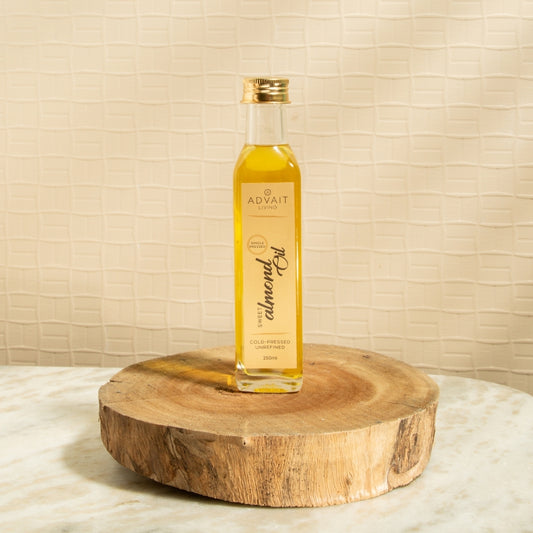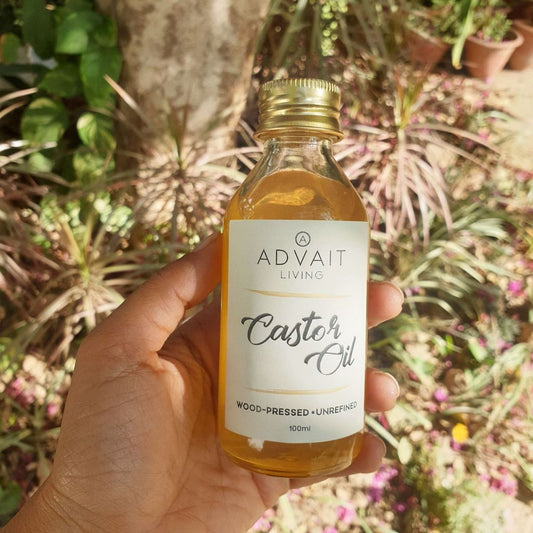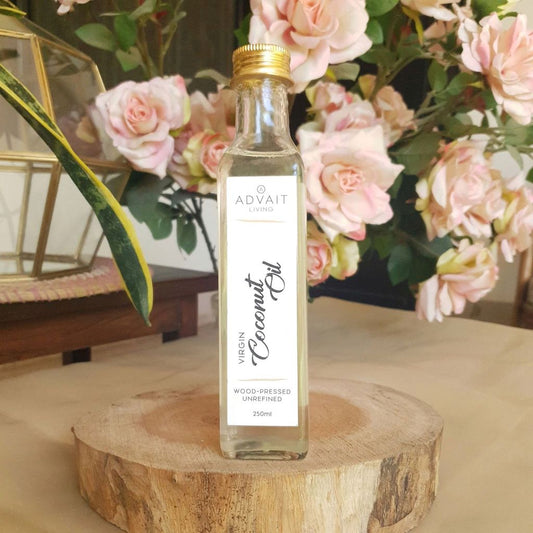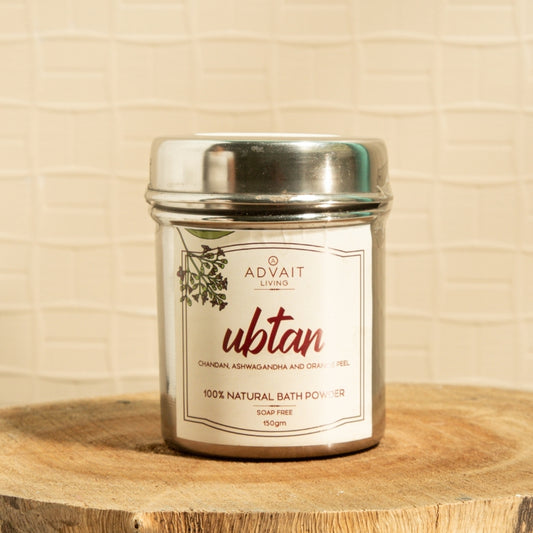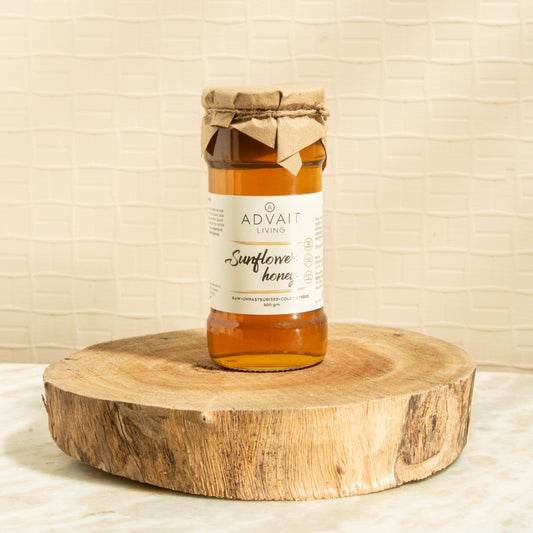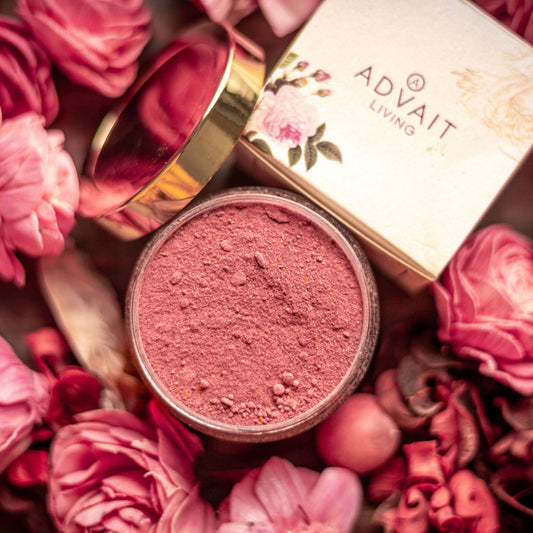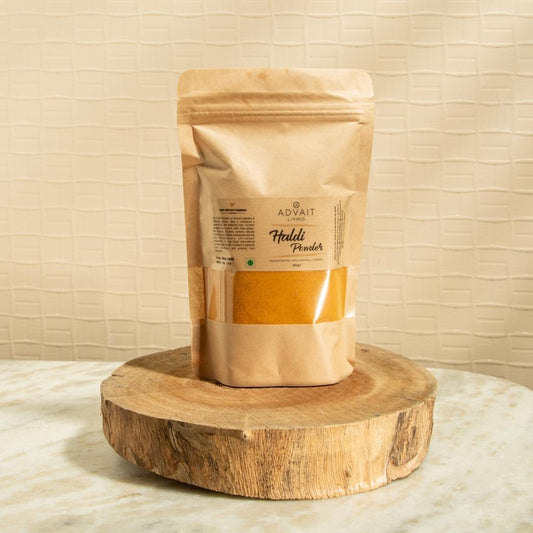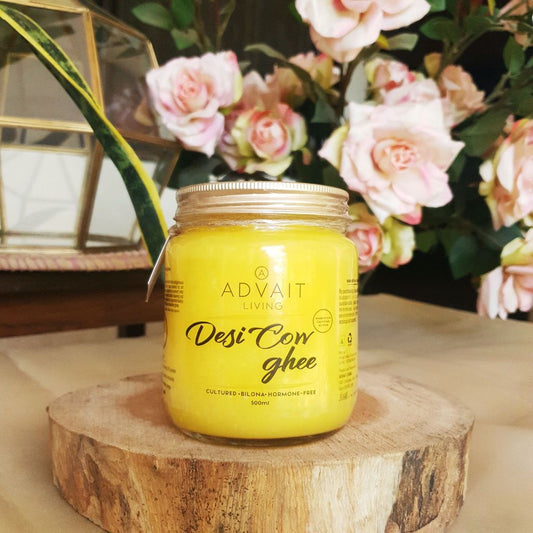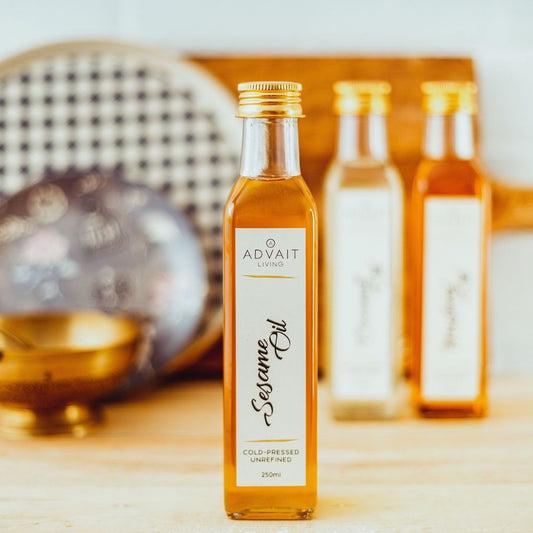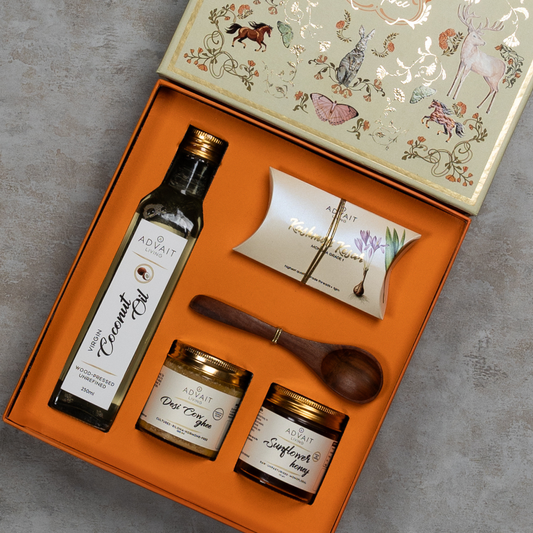Introduction
Almond oil is obtained from the seeds of the almond tree, one of the world's oldest and most cultivated nut-bearing trees. Indians have consumed almonds since ancient times due to their high nutritional and medicinal qualities. The state of Jammu and Kashmir is most renowned for its almond production. It accounts for approximately 91.26% of India's total almond production, making it the largest producer of almonds in the country. However, despite a production of 4100 tonnes (in 2024), India is still the largest importer of almonds globally, with import demand exceeding 190,000 tonnes yearly.
Use of almonds and almond oil can be traced to ancient Chinese, Ayurvedic and Greco-Persian schools of medicine to treat a variety of diseases and skin ailments. In Ayurveda, the almond tree (also known as vatada) and almond oil remedies are used to treat nerve disorders, paralysis, constipation, kidney issues, vigour, eyesight, and brain health.
Historically, it has been valued as a trusted source in beauty and cosmetic remedies! Loved for its light texture, subtle scent, and nourishing feel, sweet almond oil has been a go-to in beauty routines. This versatile oil can work wonders for your skin, providing deep hydration and anti-ageing benefits.
Whether you're looking for a natural way to cleanse your face, keep your skin supple, or ease everyday dryness, almond oil has you covered.
Almond Oil Varieties
There are two main types of almond oil: sweet almond oil and bitter almond oil. Sweet almond oil is taken out of edible grade almonds and appears as pale yellow, devoid of any odour and has a nutty taste. Whereas, bitter almond oil is extracted from Prunus amygdalus (bitter almond) and is not suitable for consumption and generally not used for skin care applications.
Not all sweet almond oils are created equal, and understanding the difference can help you choose the right one for your skincare needs. Sweet almond oil can be obtained using different extraction techniques, which have different impacts on the quality and nutritional profile of the oil.
The two methods you'll come across are cold pressed almond oil and refined almond oil. Here's what sets them apart and how to pick the one that works best for your goals.
Cold Pressed Almond Oil: Best for Skin & Hair Health
Cold pressed almond oil is extracted without heat, which helps preserve all the natural nutrients like vitamin E, essential fatty acids, and powerful antioxidants. This means the oil retains its original richness, making it especially effective for skincare and hair care.
It’s unrefined, pure, and packed with skin-loving compounds that:
-
-
- Soothe sensitive or irritated skin
- Reduce dark circles and under-eye puffiness
- Improve skin tone, elasticity, and texture
- Hydrate dry patches and support skin repair
- Nourish the scalp and promote stronger, shinier hair
-
Because it’s so nutrient-dense, cold pressed almond oil is often the go-to choice for those seeking natural, effective, and chemical-free beauty solutions.
Refined Almond Oil: Lighter Feel, Fewer Nutrients
Refined almond oil goes through heat-based processing, often involving bleaching and deodorizing. While this gives it a longer shelf life, a lighter texture, and a neutral scent, it also strips away many of the nutrients that make almond oil so beneficial in the first place.
Compared to cold pressed almond oil, refined almond oil contains lower levels of vitamin E, zinc, and antioxidants, making it less effective for deep skin nourishment or anti-ageing care.
That said, it’s still useful if you:
-
-
- Prefer a less greasy feel for daily use or massage
- Need a neutral base oil for blends
- Are looking for an affordable option with a longer shelf life
-
Just keep in mind, if you're looking for results beyond basic moisturization, cold pressed oil is always the better bet.
Nutritional Profile of Cold Pressed Sweet Almond Oil
Almonds are considered the “King of Nuts” and are full of healthy fats, fiber, phytochemicals, vitamins, and minerals that make them a nutritional powerhouse! It’s, therefore, no surprise that the oil derived from this nut is very well suited for your skincare routines. As per this Study, nearly 50% of almonds are fats and fatty acids, 19-20% are proteins, and it is rich in several vitamins and minerals:
-
-
- Carbohydrates 20%
- Protein: 19%
- Saturated Fats: 3.9%
- Monounsaturated Fats (MUFA): 32.2%
- Polyunsaturated Fats (PUFA): 12.2%
- Vitamin A, Vitamin B1, Vitamin B2, Vitamin B3 (niacin), Vitamin B6, Vitamin B9 (folic acid), Vitamin C
- Rich in minerals such as Calcium, Iron, Magnesium, Phosphorus, Potassium, Manganese, Selenium, Copper, Sodium, Zinc
- Phytonutrients such as phenolic compounds, flavonoids, alpha-tocopherol (Vitamin E), beta-tocopherol, gamma-tocopherol
- Carbohydrates 20%
-
The study also states that almonds are a significant source of amino acids, which are the building blocks of proteins. Almonds are highly rich in: essential amino acids leucine, phenylalanine and tyrosine, and non-essential amino acids glutamic acid, arginine and aspartic acid. Almonds are also a rich source of Vitamin E (among other nuts), beta-zoosterol and squalene, all great supplements for skin health. Overall, almonds have been identified as good sources of natural antioxidants with bioactive properties.
5 Benefits of Using Sweet Almond Oil for Skin
Almond oil is a powerful yet gentle natural oil that works for almost every skin type. It’s rich in vitamins, antioxidants, and healthy fats, making it a go-to for clean, effective skincare. Here’s why you’ll love it.
-
Safe for All Skin Types: It’s non-comedogenic, meaning it won’t clog pores. Perfect for sensitive, dry, or acne-prone skin.
-
Hydrates Without Feeling Greasy: Light in texture but rich in moisture. It softens dry patches and locks in hydration without leaving a heavy residue.
-
Almond Oil has a Low Comedogenic Score of 2: TA comedogenic score ranges from 0-5 and a score of 2 means that it will not clog the pores too much. Hence, it is suitable for dry and combination skins. People with oily skin and with acne must do a patch test before application.
-
Boosts Skin’s Glow & Fights Signs of Ageing: Loaded with vitamin E and antioxidants, it protects skin from damage, reduces fine lines, and supports a firmer look.
-
Soothes Irritated or Inflamed Skin: Almond oil has natural anti-inflammatory properties. It calms redness, sunburn, and skin conditions like eczema.
- 100% Natural & Chemical-Free: Cold pressed sweet almond oil is generally without any additives or artificial fragrance. It is just pure nourishment. A great choice for minimalist, toxin-free skincare.
We wrote an in-depth article on the Powerful Benefits of Almond Oil for Skin, Hair, and Body. Read it here.
Pro Tip: Use almond oil as a face serum, body oil, or part of your DIY skincare; just a few drops can make a big difference.
7 Easy Almond Oil DIYs to Incorporate Into Your Skin Care Routine
Your skincare products are only as effective as the nutrition backing them. Cold pressed almond oil, when consumed raw, supports healthy skin from the cellular level. Rich in antioxidants, anti-inflammatory agents, and healing nutrients, it offers holistic benefits, from reducing acne flare-ups to slowing signs of ageing.
Add it to your daily skincare regimen. Let your skin thank you.
1. Consume it Raw for Overall Skin Health
(Boost overall skin health and get a radiant glow from within.)
If there’s one ingredient that deserves a permanent spot in your skincare regimen, both on your plate and on your skin, it’s cold pressed almond oil. Consumed raw, this golden elixir works from within to boost your skin's overall health and resilience. Unlike topical applications that only offer surface-level benefits, eating almond oil delivers deep nourishment by addressing the root causes of dull, inflamed, or prematurely ageing skin.
Cold pressed almond oil is packed with skin-loving nutrients:
-
-
-
Vitamin E: Just 1 teaspoon (approx. 5 ml) of almond oil provides 26% of The Daily Recommended Intake of Vitamin E, a powerful antioxidant that reduces free radical damage, maintains the skin barrier, and helps retain moisture.
-
Monounsaturated fats (Omega-9 fatty acids): These healthy fats nourish cell membranes, supporting better skin elasticity and preventing dryness and inflammation.
-
Phytosterols & Polyphenols: These bioactive compounds fight oxidative stress, reduce skin sensitivity, and may protect against UV-induced damage.
-
Zinc & Magnesium: Trace minerals that promote wound healing, reduce acne flare-ups, and support skin regeneration.
-
Vitamin E: Just 1 teaspoon (approx. 5 ml) of almond oil provides 26% of The Daily Recommended Intake of Vitamin E, a powerful antioxidant that reduces free radical damage, maintains the skin barrier, and helps retain moisture.
-
In short? Raw almond oil provides your skin with the building blocks it needs to repair, protect, and glow, naturally and holistically.
While topical almond oil has been shown in studies to reduce wrinkles and improve skin tone, internal consumption offers broader, systemic benefits:
-
-
-
A 2021 Randomized Controlled Trial found that daily almond consumption improved facial pigmentation, reduced transepidermal water loss, and enhanced skin hydration in postmenopausal women.
-
Vitamin E from almond oil has been associated with reduced skin inflammation, improved healing, and a lower incidence of UV damage.
-
Oleic acid, the primary fatty acid in almond oil, plays a role in reducing pro-inflammatory markers in the body, which benefits skin conditions like eczema, psoriasis, and acne.
-
The antioxidant profile of almond oil supports the body’s ability to neutralise oxidative stress, one of the leading causes of premature ageing and dull skin.
-
A 2021 Randomized Controlled Trial found that daily almond consumption improved facial pigmentation, reduced transepidermal water loss, and enhanced skin hydration in postmenopausal women.
-
2. Deep Hydration Almond Oil Face Mask
(Helps hydrate the skin, improves skin barrier and pulls moisture from the air and deeper layers of the skin to the stratum corneum.)
If your skin needs a serious moisture boost, almond oil is a fantastic base for a DIY face mask. It sinks in deep, helping to restore your skin’s natural moisture balance and leaving it soft, smooth, and noticeably hydrated. Research backs this up, almond oil is especially effective for dry and sensitive skin. Thanks to its light texture and rich lipid content, it easily reaches the deeper layers of your skin, improving both hydration and overall skin tone.
Ingredients:
-
- 1 teaspoon of Almond oil (15 ml)
- Honey
- Aloe vera
How do you use almond oil face masks for the best results?
Mix a teaspoon of almond oil with honey and aloe vera. Apply for 15–20 minutes. Use once or twice a week, especially during dry seasons or after sun exposure.
3. Almond Oil Face Pack for Even Skin Tone and Skin Brightening
(Reduces pigmentation and improves uneven skin tone.)
This gentle yet powerful mask works to fade pigmentation, calm inflammation, and restore glow, making it ideal for Indian skin, which is often prone to tanning, uneven tone, and post-acne marks.
Curd contains lactic acid, a gentle AHA (alpha hydroxy acid) that exfoliates dead skin, improves texture, and brightens dull areas. Turmeric is rich in curcumin, known for its anti-inflammatory and depigmenting properties. It helps reduce dark spots, acne scars, and sun-induced pigmentation. Almond oil replenishes the skin's lipid barrier, deeply moisturizes, and delivers antioxidants that promote healing and glow from within
Ingredients:
-
- 1 tsp fresh curd (dahi)
- ½ tsp cold-pressed almond oil
- A pinch of turmeric (haldi) – preferably wild turmeric or Kasturi manjal
How to Use:
-
- Mix all the ingredients into a smooth paste.
- Apply evenly on a cleansed face and neck.
- Leave it on for 10–15 minutes.
- Rinse off with lukewarm water using gentle circular motions.
- Pat dry and follow with a light moisturizer (if used during the day).
4. Under-Eye Serum
(Works well for those bags under eyes, dark circles from stress and long nights you are putting in at work.)
Almond oil is particularly gentle and effective for under-eye care. Its anti-inflammatory properties and vitamin K content help boost blood circulation around the eyes, while its non-comedogenic nature ensures it won’t clog pores. You don't need any carrier oils or special formulation for this. Use a few drops of good, Cold Pressed Sweet Almond oil like Advait Living's, and you'll be good to go!
How to use almond oil as an under-eye serum?
Dab a small drop under each eye at night using your ring finger to reduce puffiness, lighten dark circles, and minimize fine lines. Massage gently in a circular motion while keeping your eyes closed. It helps with increasing blood flow and reducing fluid retention. Use nightly for best results.
5. Almond Oil Body Scrub
(Great for exfoliation of dead skin, helps manage strawberry skin.)
Almond oil works wonderfully as a base for a nourishing body scrub that not only exfoliates but also deeply moisturises the skin. When combined with coarse sugar or ground oats, it helps slough off dead skin cells while the oil softens and hydrates, making it especially effective for rough areas like elbows, knees, and the back of the arms. This scrub is gentle yet effective, and works for all skin types, especially those with dry or textured skin. You can adjust the coarseness depending on your sensitivity.
Ingredients:
-
- 2 tablespoons Cold Pressed Sweet Almond Oil
- 2 tablespoons coarse sugar or finely ground Oats
How to use the Almond Oil Body Scrub?
Use the scrub on damp skin during a warm shower. Gently massage in circular motions for a few minutes, focusing on dry or rough areas. Rinse off with lukewarm water. Pat dry and skip any additional moisturiser unless needed. Your skin will already feel soft, nourished, and refreshed. Regular use, about once a week in the shower, can reduce the appearance of strawberry skin and leave you with visibly smoother, more radiant skin without relying on synthetic exfoliants.
6. Almond Oil Face Serum for Anti-Ageing
(Helps improve fine lines, wrinkles and sagging skin. Collagen boosting and naturally reverses signs of ageing.)
Cold pressed almond oil can be used as an effective night time face serum to enhance glow and reduce signs of ageing. Due to its light texture, easy absorption into the skin and high concentration of active ingredients, almond oil can be a fantastic natural serum.
Almond oil is a natural moisturiser with deep hydrating properties. Its natural concentration of Vitamin E and antioxidants further help combat free radical damage, while compounds like palmitic acid and retinol precursors support collagen production, improving firmness and skin tone over time.
Ingredients:
-
- 15 ml Organic Cold Pressed Sweet Almond oil
- 1-2 drops of Evening Primrose oil/ Jojoba oil
- 5-6 drops of Rose water/ Aloe vera gel
How to use an Almond oil serum?
Apply a few drops on clean skin before bed, gently massaging in upward motions. With consistent use, it helps diminish fine lines and enhances natural radiance without the need for synthetic serums.
This recipe works on everything, from oily, acne-prone skin to dry skin types. Evening primrose and jojoba essential oils are easily available in India and help in soothing the skin from inflammation and deep hydration.
7. Massage Oil (For Babies)
Pure Almond oil serves as a wonderful massage oil for both adults and babies. Its light texture, quick absorption, and nourishing profile make it ideal for promoting relaxation and enhancing blood circulation. It helps with getting the nutrients to the deeper skin cells because of its permeable nature.
For baby massage specifically, almond oil supports skin development and soothes irritation.
Know Your Skin Type
Before incorporating almond oil into your skincare regimen, it is crucial to determine your skin type. Almond oil is generally safe for most skin types, but it's important to be aware of a few things:
1. Dry Skin: Almond oil is an excellent choice for dry skin because it can provide long-lasting hydration and effectively lock in moisture.
2. Sensitive Skin: Almond oil is gentle and mild, making it suitable for individuals with sensitive skin. It can help alleviate redness and reduce swelling.
3. Combination Skin: If you have combination skin, you can apply almond oil to the drier areas of your face (such as the cheeks) while avoiding the oilier zones (like the T-zone).
4. Oily and Acne-Prone Skin: Although almond oil is non-comedogenic, it's crucial to conduct a patch test before applying it to acne-prone skin. If you have oily skin, it is advisable to use almond oil sparingly, as it can potentially increase the moisture content.
When to Apply Almond Oil?
Almond oil can be applied at any time of day, but here are some tips for when to use it:
- Morning: Apply almond oil as a light and hydrating base for your makeup or as a moisturizer.
- Night: For deep hydration, apply almond oil before sleep. Its dense, moisturizing composition will work miracles while you sleep.
- Special Treatments: If your skin is excessively dry, irritated, or flaky, almond oil can be applied as a treatment to replenish moisture and soothe the skin.
Conclusion
Almond oil is an incredibly versatile skincare ingredient that provides a natural and nourishing solution for a wide range of skin concerns. Its capacity to hydrate, calm, and combat the visible signs of ageing makes it an essential addition to your skincare collection. Whether it's applying moisturizer or trying out homemade treatments, almond oil can be seamlessly integrated into your skincare regimen. Provide your skin with the care it needs with this uncomplicated yet powerful oil.
Frequently Asked Questions
1. What are the benefits of almond oil?
Almond oil offers multiple benefits for skin, hair, and overall health. For skin, it helps:
-
- Moisturize and soften dry skin
- Reduce signs of ageing and fine lines
- Improve skin elasticity and tone
- Soothe inflammation and irritation
- Lighten dark circles and pigmentation
It also supports heart health, improves digestion, and nourishes hair when consumed internally.
2. What does almond oil do for your skin?
Almond oil deeply nourishes the skin with its rich content of vitamin E, fatty acids, and antioxidants. It helps moisturize dry skin, improves skin tone and texture, soothes irritation, supports skin repair, and protects against environmental damage. Regular use of almond oil can make the skin softer, smoother, and more radiant.
3. I have ultra-sensitive skin. Will almond oil be suitable for my face?
Yes, Almond oil is considered suitable for ultra sensitive skin due to its gentle, non-irritating, and lightweight nature. It also boasts emollient and hydrating properties that can soothe and moisturize without triggering adverse reactions. However, always do a patch test first to check for any reactions.
4. Is almond oil better than coconut oil for the face?
Yes, for sensitive or acne-prone skin, almond oil is lighter, absorbs better, and is less likely to clog pores compared to coconut oil. This is because almond oil is generally considered a moderately comedogenic oil, meaning it has low to moderate chances of clogging the pores. However, it's a good option for combination to dry skin types.
Coconut oil is a higher comedogenic oil, with a rating of 4, which is higher than almond oil. This means it's more likely to clog pores and potentially lead to breakouts.
5. Can almond oil lighten skin?
Almond oil may help brighten skin tone and reduce the appearance of dark spots or pigmentation due to its vitamin E and anti-inflammatory properties. While it doesn't "whiten" the skin, it supports a more even-toned, radiant complexion by nourishing the skin and reducing oxidative damage over time.










